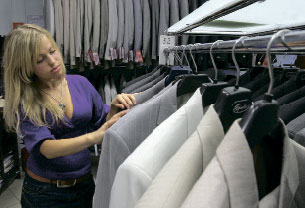The meeting with the Head of State focused on the need to regulate ‘grey’ imports by entrepreneurs, which are causing inequality of conditions for light industry. According to the President, entrepreneurs must ensure transparency, so that they operate under the same conditions as others on the market. He emphasises that it would be most advantageous to see small traders purchasing more domestic goods for local sale.

Quality of the good is in its price
Prime Minister Andrei Kobyakov notes that our light industry has great potential, having been modernised and enjoying ongoing technical re-equipment. Over the last four years, Bellegprom concern has attracted $356 million of investments into its basic capital. Only 42 percent of its equipment is now in need of updating. However, problems remain, with light industry exports having risen just under 8 percent since 2010: a rather modest figure.
More than a half of Bellegprom’s production is currently exported (to 55 countries) which indicates demand abroad, but ground is being lost to foreign competitors: particularly, China. Even traditionally strong markets are feeling the pressure.
Last year was difficult for the private sector, including for light industry, with warehouse stock being held in volumes far larger than is desirable, and total accounts receivable having significantly risen. Nikolay Yefimchik, who heads Bellegprom, tells us that seven enterprises hold the lion’s share of warehouse stock, despite being clear leaders in the branch (among them Belwest, Marko and Milavitsa).
The Prime Minister blames the situation partly on scarcity of assortment, due to production failing to reflect consumer demand, and high prices. Domestically sewn jackets, trousers, blouses and coats are, strangely, being priced no cheaper than imported goods. Clearly, enterprises need to move with trends, and offer a greater range of goods, at a competitive price. Quality is not in question but more is needed to secure sales. How can Belarus hope to compete abroad if it does not even lead on its own market?
Mr. Kobyakov underlines that retail networks are expanding but more could be done, including offering entrepreneurs franchises, and greater participation in stock sales and fairs, as well as online trading.
By Alexander Benkovsky











